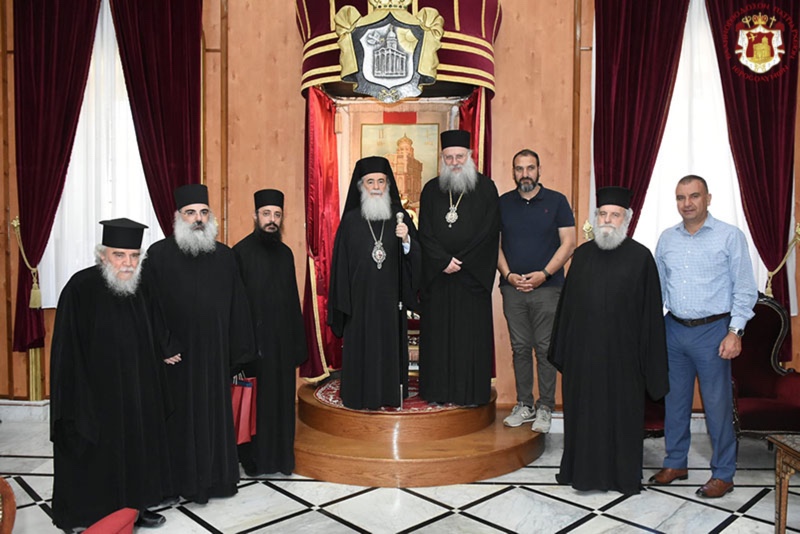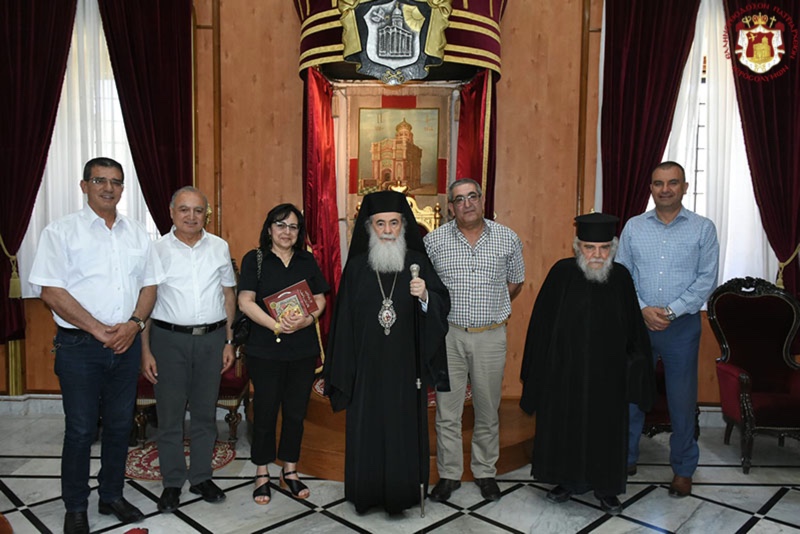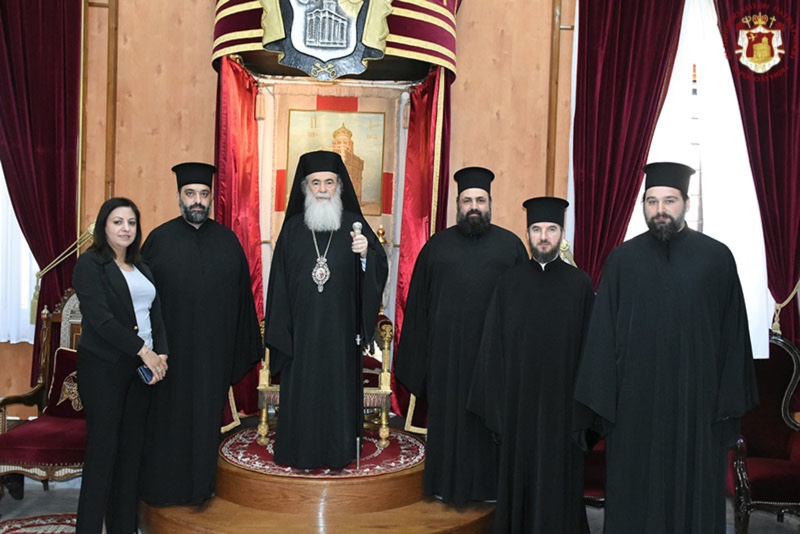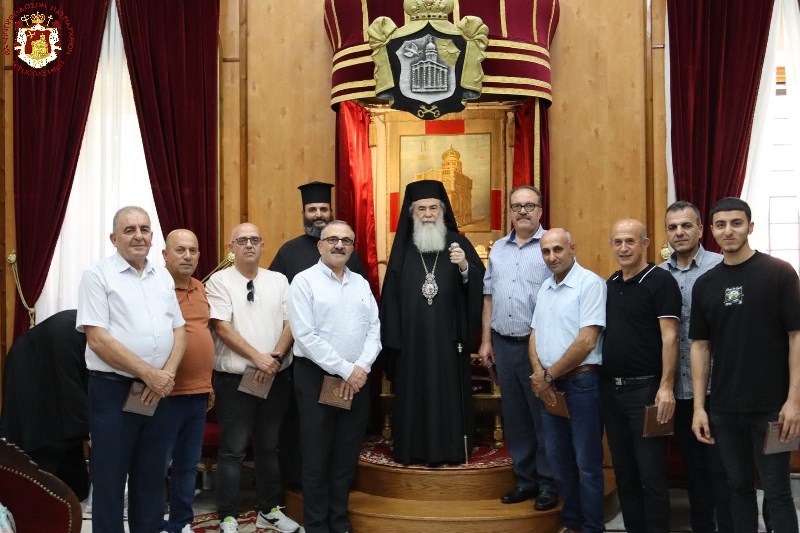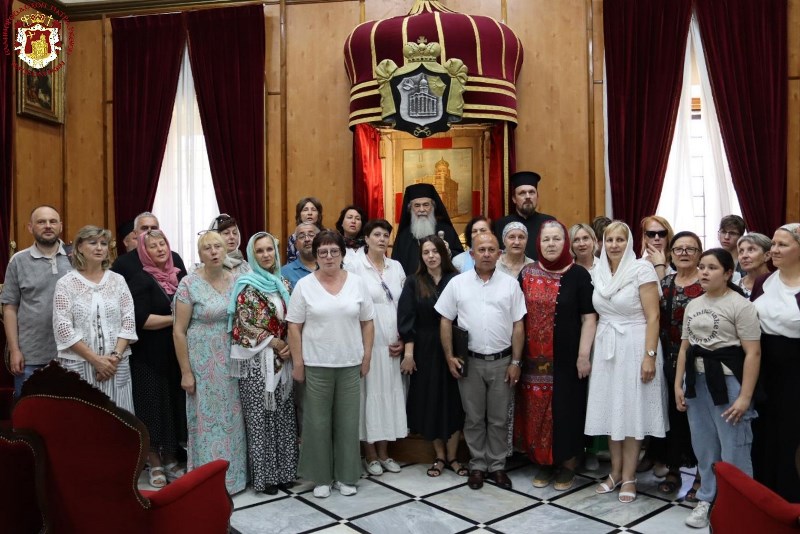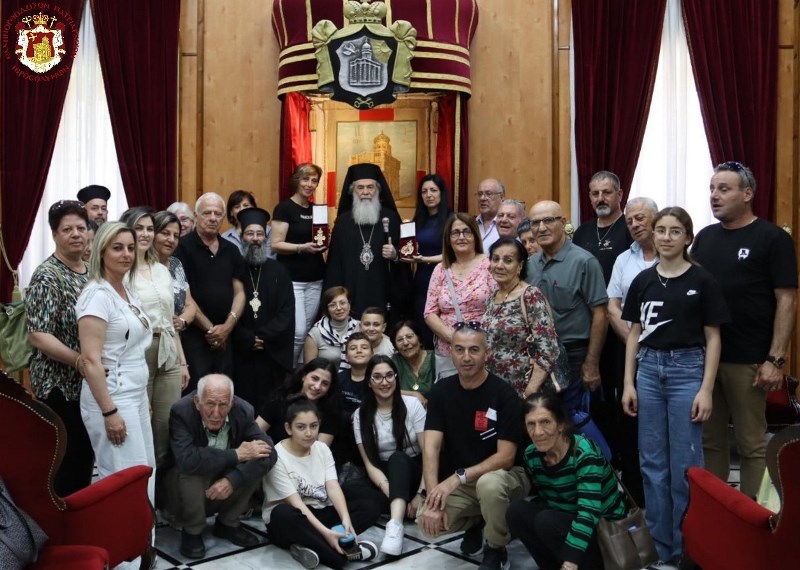On the Sunday of the Paralytic, May 13/26, 2024, the miracle of the healing of the Paralytic by the Lord was celebrated by the Patriarchate, as told by the Evangelist John (5:2-16) in the Sheep’s Pool, which had five porches, next to the Temple of Solomon.
The Lord, through these life-giving words, tightened the paralyzed limbs of the man who lived in paralysis for thirty-eight years and gave him the strength to lift his bed and walk.
This miracle was celebrated in the neighboring Nazareth town of Reine.
His Beatitude was received with a warm welcome by the Scouts, the Priests and the people, and celebrated the Divine Liturgy in the Church of Saint George, with: their Eminences, Metropolitan Kyriakos of Nazareth, the Archbishops Aristarchos of Constantina and Aristovoulos of Madaba, the Eldler Kamarasis Archimandrite Nectarios, local Priests, among whom Fr Simeon, who serves in this community, and Russian-speaking Elders, under the chanting of the Byzantine choir of the Church in Greek and Arabic.
Before the Holy Communion His Beatitude delivered the following sermon:
“In Solomon’s Porch, there lay a multitude of sick folk. And at Mid-feast, Christ found there a paralytic who had been bedridden for eight and thirty years. To him He called out with a voice of authority: Wilt thou be made whole? And the infirm man replied: Sir, I have no man, when the water is troubled, to put me into the pool. And He saith unto him: Take up thy bed. Behold, thou art made whole, sin no more. By the intercessions of the Theotokos, O Lord, send upon us Thy great mercy” (Vespers, Aposticha, Glory), the hymnographer of the Church proclaims.
Beloved Brethren in Christ,
Reverend Christians
Our God and Saviour Jesus Christ, Who healed our infirmities and sufferings, brought us all together today, the fourth Sunday after Easter, in the surrounding Church of your laudable Rum Orthodox Community in Reine, so that we may celebrate with thanksgiving the feast commemorated miracle by Saint John the Evangelist of the healing of paralytic man.
In today’s Gospel narrative, we distinguish two things: first, the thirty-eight-year-old paralyzed man who had his illness, who hoped for his healing in the power of God. “For an angel went down at a certain season into the pool, and troubled the water: whosoever then first after the troubling of the water stepped in was made whole of whatsoever disease he had” (John 5, 4), the Evangelist John says. And secondly, the presence of Jesus at the place of the sheep’s pool, saying to the paralytic man: “Wilt thou be made whole? The impotent man answered him, Sir, I have no man, when the water is troubled, to put me into the pool: but while I am coming, another steppeth down before me. Jesus saith unto him, Rise, take up thy bed, and walk” (John 5, 6-8).
According to the approved fathers of the Church, Christ chooses the specific paralytic among the many sick to demonstrate that man in general is a great wound and that the Word of God, Christ is the unique and indisputable healer of man’s physical and mental wounds, as St. Cyril of Jerusalem says: “where the Saviour is seen, there is also the salvation of man. He goes to meet Matthew the publican and not only does He make him His disciple, but also an Apostle and Evangelist. He resurrects the dead, gives sight to the blind, to the deaf the ability to hear. He goes around the pools of water, not so much to admire the buildings, but “to heal the sick people”.
The Psalmist also testifies to the fact that man is a great wound (trauma), that is, a mental and physical illness, and our Lord Jesus Christ is man’s physician: ” Bless the Lord, O my soul… Bless the Lord, O my soul, and forget not all his benefits: Who forgiveth all thine iniquities; who healeth all thy diseases;” (Ps. 102, 1, 3).
In other words, the Lord forgives and heals not only the moral evil, i.e. sin, but also the physical evil, i.e. disease.
That is why Jesus says imperatively to the paralytic: “Take up thy bed and walk” (John 5:8). Interpreting the Lord’s words, St. Chrysostom says: “Not only does He command the man to stand up, but also to take up his bed, so that what is happening is believed to be a miracle and nothing of imagination, nor thought to be some sort of hypocrisy”, and St. Cyril of Alexandria says, ” the command was God-like and of superhuman strength and power. He does not seek the solution of the disease so that it does not appear like that of the holy prophets, but as the Lord powerfully commands it to be done”.
Although the miracle that took place, the healing of the Paralytic was not imaginary or fake, Christ acted as the Lord of Powers authoritatively and not as one of the Prophets. This exact truth that Jesus Christ is ” the King of kings, and Lord of lords; Who only hath immortality, dwelling in the light which no man can approach unto; whom no man hath seen, nor can see”, (1 Tim. 6, 15-16) according to Saint Paul, the Holy Church of our Christ proclaims and confesses forthwith on the current feast of the feasts of Easter, of the luminous Resurrection of our Saviour Christ. “Christ is the new Pascha, the living sacrificial Victim, the lamb of God that takes away the sin of the world” (Megalynarion 3, Ode 9 of Easter Sunday), the hymnographer of the Church proclaims.
After this, Jesus finds him [the paralytic man] in the sanctuary and says to him: ” Behold, thou art made whole: sin no more, lest a worse thing come unto thee” (John 5:14). Commenting on this speech of Jesus, Saint Cyril says: with these words, Jesus teaches that God not only stores up people’s faults for the future judgment, but also that He scourges people in different ways, in so far as they are in life physically before the great and famous day of the judgment of all things. The wise Paul will testify that we are often afflicted, and tested when we sin and grieve God. “For this cause, many are weak and sickly among you, and many sleep. For if we would judge ourselves, we should not be judged. But when we are judged, we are chastened of the Lord, that we should not be condemned with the world” (1 Cor. 11, 30-32).
With His words, ” Behold, thou art made whole: sin no more, lest a worse thing come unto thee” (John 5:14), Jesus pointed out to the healed and recovering Paralytic the great danger that relapse entails, that is, the return to the sinful life or better said, the repetition of the transgressions of sin, which brought about the physical and mental, but also the incurable paralysis. Sins, my beloved brothers and sisters, are forgiven, as long as the person’s repentance is sincere. “A broken and a contrite heart, O God, thou wilt not despise”, (Ps. 51, 19), the psalmist says. However, the scars of sin remain in the soul, just as they remain in the body after the wounds have been healed, as the great Father of the Church Athanasios says: “he who repents of his sins ceases [to sin], he [nevertheless] has the scars of his wounds”, for this reason, Saint Isidore of Pelusion also points out this truth by saying: after your repentance and confession, do not proceed without fear/fear to sin. Because, even if you are healed again, the scar shows that some passion wounded the soul.
In other words, after the relapse, the soul hardens and repentance becomes very difficult, as Saint Theophilaktos interprets: “He who does not improve by the previous punishment will go to hell as an insensible and scorner”. [He who has not improved himself from the previous punishment is led to worse hells as an insensible and a scorner]. Therefore, my beloved brothers, let us beseech the Lord our God who raised the dead of old and after the hymnographer let us say: “Even as Thou didst raise up the paralytic, O Christ, heal my soul which is palsied by transgressions, and prosper me to walk in Thine upright paths” (Matins, Ode 5, Troparion 10). Amen. Christ is Risen!”
His Beatitude addressed also those present in the reception as follows:
“Strengthened with all might, according to his glorious power, unto all patience and longsuffering with joyfulness; Giving thanks unto the Father, which hath made us meet to be partakers of the inheritance of the saints in light: Who hath delivered us from the power of darkness, and hath translated us into the kingdom of his dear Son: In whom we have redemption through his blood, even the forgiveness of sins” (Col. 1, 11-14), Saint Paul preaches.
Reverend Fathers,
Honorable President and honorable members of the Ecclesiastical Council,
Beloved brothers in Christ,
Today’s Easter Synaxis with you fills our hearts with joy and gladness. And this, because we discern that although we are numerically few, steadfast in God, who delivered us from the power of darkness” (Col. 1:13), you have the hope of the light of the Resurrection.
Our holy Church of Jerusalem, the source of the eternal light of the three-day Resurrection of Christ and our Saviour, but also the mother of the Churches, preaches and denounces Christ crucified and Risen not only evangelically and spiritually, but emotionally and physically. ” That which was from the beginning, which we have heard, which we have seen with our eyes, which we have looked upon, and our hands have handled, of the Word of life”, (1 John. 1,1) according to the testimony of Saint John the Evangelist and Theologian.
The Rum Orthodox Patriarchate of Jerusalem, that is, the Church of Jerusalem, is the body of Christ, while we, both clergy and the people, are the members of His body and the “remnant chosen by grace” (Romans 11, 5).
And this “remnant chosen by grace”, is no other than the faithful people of God, who confess to the Kingdom of the Son of love, peace, and righteousness. “God is love; and he that dwelleth in love dwelleth in God, and God in him” (1 John 4, 16). Saint James the Brother of God says regarding Job’s patience: “Ye have heard of the patience of Job, and have seen the end of the Lord; that the Lord is very pitiful, and of tender mercy” (James 5, 11).
It is precisely this infinite love, philanthropy, and compassion that our holy Church proclaims, through the feast of the memory of the miracle of the paralytic man found in the sheep’s pool, who had his disease for thirty-eight years. (Cf. 3, 15).
The whole world and especially our region of the Middle East and the Gaza Strip, my beloved brothers, is being tested by the cruelty and the deadly poison of war and its consuming fire (Cf. Heb. 12-29). This is due to the arrogance of people’s lives (Cf. 1 John 2-16), but also to sin, as Saint John the Theologian preaches saying: ” Whosoever committeth sin transgresseth also the law: for sin is the transgression of the law” (1 John. 3,4) This is why the physician of our souls and bodies, the Lord Jesus Christ, says to the paralytic: “Behold, thou art made whole: sin no more, lest a worse thing come unto thee.” (John 5, 14).
And we, my beloved brothers, are called to walk in the light of Christ, in Him in whom we believe, “so that darkness may not overtake us”, (John 12, 35). Christ is Risen. Many and peaceful returns.
Then His Beatitude bestowed upon the Community of Reine the beautiful icon of the Theotokos for the protection of their parish.
After this, His Beatitude consecrated the new centre of the Community, which was founded on the ground the Patriarchate had bought, which was called “Makar Rum”, that is, “the Hearth of Romiosyni”.
From Secretariat-General
https://www.facebook.com/share/v/oeeCikgi36AsaCdw/
